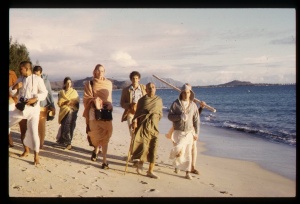CC Antya 1.35 (1975): Difference between revisions
(Vanibot #0027: CCMirror - Mirror CC's 1996 edition to form a basis for 1975) |
(Vanibot #0020: VersionCompareLinker - added a link to the Version Compare feature) |
||
| Line 2: | Line 2: | ||
<div style="float:left">'''[[Sri Caitanya-caritamrta (1975)|Śrī Caitanya-caritāmṛta (1975)]] - [[CC Antya (1975)|Antya-līlā]] - [[CC Antya 1 (1975)|Chapter 1: Śrīla Rūpa Gosvāmī's Second Meeting With the Lord]]'''</div> | <div style="float:left">'''[[Sri Caitanya-caritamrta (1975)|Śrī Caitanya-caritāmṛta (1975)]] - [[CC Antya (1975)|Antya-līlā]] - [[CC Antya 1 (1975)|Chapter 1: Śrīla Rūpa Gosvāmī's Second Meeting With the Lord]]'''</div> | ||
<div style="float:right">[[File:Go-previous.png|link=CC Antya 1.34 (1975)|Antya-līlā 1.34]] '''[[CC Antya 1.34 (1975)|Antya-līlā 1.34]] - [[CC Antya 1.36 (1975)|Antya-līlā 1.36]]''' [[File:Go-next.png|link=CC Antya 1.36 (1975)|Antya-līlā 1.36]]</div> | <div style="float:right">[[File:Go-previous.png|link=CC Antya 1.34 (1975)|Antya-līlā 1.34]] '''[[CC Antya 1.34 (1975)|Antya-līlā 1.34]] - [[CC Antya 1.36 (1975)|Antya-līlā 1.36]]''' [[File:Go-next.png|link=CC Antya 1.36 (1975)|Antya-līlā 1.36]]</div> | ||
{{CompareVersions|CC|Antya 1.35|CC 1975|CC 1996}} | |||
{{RandomImage}} | {{RandomImage}} | ||
==== TEXT 35 ==== | ==== TEXT 35 ==== | ||
| Line 11: | Line 10: | ||
<div class="verse"> | <div class="verse"> | ||
:vṛndāvane nāṭakera ārambha karilā | :vṛndāvane nāṭakera ārambha karilā | ||
:maṅgalācaraṇa | :maṅgalācaraṇa 'nāndī-śloka' tathāi likhilā | ||
</div> | </div> | ||
| Line 25: | Line 24: | ||
<div class="translation"> | <div class="translation"> | ||
In Vṛndāvana, Rūpa Gosvāmī began to write a drama. In | In Vṛndāvana, Rūpa Gosvāmī began to write a drama. In particuIar, he composed the introductory verses to invoke good fortune. | ||
</div> | </div> | ||
| Line 32: | Line 31: | ||
<div class="purport"> | <div class="purport"> | ||
Śrīla Bhaktisiddhānta Sarasvatī Ṭhākura quotes from the Nāṭaka-candrikā, wherein | Śrīla Bhaktisiddhānta Sarasvatī Ṭhākura quotes his notes from the Nāṭaka-candrikā, wherein he has written: | ||
:prastāvanāyās tu mukhe | |||
:nāndī kāryāśubhāvahā | |||
āśīr-namaskriyā-vastu- | |||
nirdeśānyatamānvitā | |||
:aṣṭābhir daśabhir yuktā | |||
:kiṁvā dvādaśabhiḥ padaiḥ | |||
:candranāmāṅkitā prāyo | |||
maṅgalārtha-padojjvalā | |||
:maṅgalaṁ cakra-kamala- | |||
cakora-kumudādikam | |||
Similarly, in the Sixth Chapter of the Sāhitya-darpaṇa, text 282, he has said: | |||
: | |||
āśīr-vacana-saṁyuktā | |||
:stutir yasmāt prayujyate | |||
deva-dvija-nṛ-pādīnāṁ | |||
:tasmān nāndīti saṁjñitā | |||
The introductory portion of a drama, which is written to invoke good fortune, is called nāndī-śloka. | |||
</div> | </div> | ||
Latest revision as of 20:26, 26 January 2020

A.C. Bhaktivedanta Swami Prabhupada
TEXT 35
- vṛndāvane nāṭakera ārambha karilā
- maṅgalācaraṇa 'nāndī-śloka' tathāi likhilā
SYNONYMS
vṛndāvane—at Vṛndāvana; nāṭakera—of the drama; ārambha—the beginning; karilā—wrote; maṅgalācaraṇa—invoking auspiciousness; nāndī-śloka—introductory verse; tathāi—there; likhilā—he wrote.
TRANSLATION
In Vṛndāvana, Rūpa Gosvāmī began to write a drama. In particuIar, he composed the introductory verses to invoke good fortune.
PURPORT
Śrīla Bhaktisiddhānta Sarasvatī Ṭhākura quotes his notes from the Nāṭaka-candrikā, wherein he has written:
- prastāvanāyās tu mukhe
- nāndī kāryāśubhāvahā
āśīr-namaskriyā-vastu- nirdeśānyatamānvitā
- aṣṭābhir daśabhir yuktā
- kiṁvā dvādaśabhiḥ padaiḥ
- candranāmāṅkitā prāyo
maṅgalārtha-padojjvalā
- maṅgalaṁ cakra-kamala-
cakora-kumudādikam
Similarly, in the Sixth Chapter of the Sāhitya-darpaṇa, text 282, he has said:
āśīr-vacana-saṁyuktā
- stutir yasmāt prayujyate
deva-dvija-nṛ-pādīnāṁ
- tasmān nāndīti saṁjñitā
The introductory portion of a drama, which is written to invoke good fortune, is called nāndī-śloka.